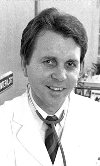“The greatest obstacle to discovery,” argues Barry Marshall, “is not ignorance—it is the illusion of knowledge.”
Marshall is the co-discoverer of Helicobacter pylori, the bacterium that causes stomach ulcers, for which he won the 2005 Nobel Prize in Medicine.

But his hypothesis initially met with great resistance from the medical establishment, which was strongly committed to the belief that ulcers were caused by acids from poor diets or stress. And at that time Marshall was a young faculty member, so his prospects for getting a research grant for his wild hypothesis were non-existent.
‘The solution? “The short-cut through that problem was just to do a human experiment,” Marshall says. “But if I had put in a proposal, everybody would have said ‘Here’s this junior guy doing eccentric research in our hospital. Are we going to let him give these bacteria to medical students or other people?’ I would have gotten nowhere.”
‘To Marshall, his next move was clear. Without informing his family — “It’s a lot easier to obtain forgiveness than permission,” he quips — Marshall drank a Petri dish full of H. pylori extracted from a patient suffering from gastric ulceration. “Well, here it goes, down the hatch,” is what he recalls saying before drinking. His lab technicians were horrified.
‘As he had hoped and expected, Marshall soon developed painful gastritis. He endured two weeks of vomiting, appetite loss, and halitosis (bad breath can be a marker of H. pylori infection), during which time two endoscopies confirmed both his infection and the ulcerative damage to his stomach mucosa. “So, great experiment!” exclaims Marshall, with his trademark devil-may-care exuberance.
‘A confession to his wife — and a course of antibiotics — eventually set everything right.”
Great story.
Dr. Marshall’s primary position currently is with the University of Western Australia, though he also holds positions at Pennsylvania State University and the University of Virginia. Here are Wikipedia entry on Dr. Marshall, a New Scientist report, and a Penn State University profile.
Related: Francis Bacon’s early-modern philosophy of experimental science, in the Philosophers Explained series.
Comments are closed.